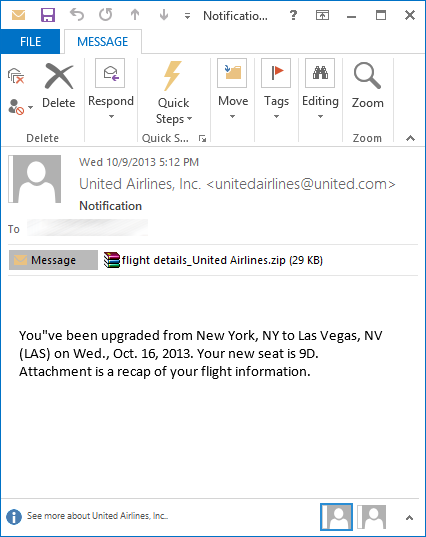Fraudsters Promise Airplane Seat Upgrade; Steal Passwords

Travelers who fly from New York to Las Vegas on Wednesday, October 16th, may fall victim to the most recent malicious spam shower on the Internet where criminals hunt credentials of fresh FTP accounts.
The fake message concisely informs travelers they have been upgraded and are invited to check the flight information attached. “You’ve been upgraded from New York, NY to Las Vegas, NV (LAS) on Wed., Oct. 16, 2013. Your new seat is 9D. Attachment is a recap of your flight information.” reads the message.
By accessing the attachment, people get their systems infected with a Trojan (identified by Bitdefender as Trojan.Downloader.JQCM ) that downloads another malicious piece of code (Trojan.GenericKD.1328431) to steal login credentials and passwords. Crooks appear utterly interested in new FTP accounts because the code comprises a huge list of FTP clients, including FAR, CuteFTP, FlashFXP, Bullet Proof FTP, SmartFTP, TurboFTP, SecureFX, LeechFTP, FTPGetter, ALFTP, FTP++, UltraFXP, FTPVoyager, WinFTP, DeluxeFTP, Staff-FTP, FreshFTP, BlazeFTP, GoFTP, 3D-FTP, EasyFTP, FTPNow, FTPShell, FTP Navigator, FTP Commander, FFFTP, COREFTP, ClassicFTP, LeapFTP, Total Commander, FileZilla, Robo-FTP. Attackers may want credentials to FTP accounts to host on them malicious code to be used in future attacks.
Browser-related credentials for Internet Explorer, Mozilla Firefox and Google Chrome and e-mail login data are other key points of interests. The Trojan takes screenshots and monitors e-mail clients, including Outlook, The Bat, Windows Live Mail, IncrediMail, or Thunderbird.
The initial downloader Trojan uses software restriction policy to avoid the locally installed AV solutions. Once it downloads and registers the payload, it wipes any trace of itself.
Although the message targets United Airlines customers, chances are other people traveling next week will be tempted to open the attachment and check the flight information.
Never open e-mail attachments delivered by messages you haven’t requested. Double-check the sender’s address and, if you don’t recognize it, delete it at once.
If you receive a message from a flight company and you are not sure it’s legit, call the company or pay them a visit to check the validity of their claim.
Use an antivirus and keep all your software up to date.
This article is based on the spam samples provided courtesy of Adrian MIRON, Bitdefender Senior Antispam Researcher and the technical details offered by Doina COSOVAN and Alexandru MAXIMCIUC, Bitdefender Virus Analysts.
All product and company names mentioned herein are for identification purposes only and are the property of, and may be trademarks of, their respective owners.
tags
Author
A blend of product manager and journalist with a pinch of e-threat analysis, Loredana writes mostly about malware and spam. She believes that most errors happen between the keyboard and the chair.
View all postsRight now Top posts
Uncovering IoT Vulnerabilities: Highlights from the Bitdefender - Netgear 2024 Threat Report
June 26, 2024
UEFA EURO 2024 Scams Are Already Here – How to Stay Safe
June 25, 2024
Most People Still Write Important Passwords Down, Bitdefender Report Finds
June 07, 2024
FOLLOW US ON SOCIAL MEDIA
You might also like
Bookmarks








